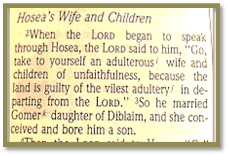 Brokenness From 3 Sources
Brokenness From 3 Sources
If you haven’t yet read the book, Love in a Broken Vessel, let me give you a short synopsis. It’s the story of a faithful prophet, Hosea, who is commanded by God to marry a prostitute named Gomer. Much of this novel is based on the biblical record of Hosea, Isaiah, Micah, Jonah, Amos, 2 Kings, and 2 Chronicles; however, some details are drawn from historical documents, while other aspects spring from my imagination.
God’s Heart Was Broken
Scripture makes it clear that Hosea is to live out God’s broken heart by marrying a prostitute, and that her repeated betrayals will signify Israel’s propensity to love and worship other gods.
“When the Lord began to speak through Hosea, the Lord said to him, ‘Go, take to yourself an adulterous wife and children of unfaithfulness, because the land is guilty of the vilest adultery in departing from the Lord.’” Hosea 1:2
“For I desire mercy, not sacrifice, and acknowledgment of God rather than burnt offerings. Like Adam, they have broken the covenant—they were unfaithful to me there.” Hosea 6:6-7
Think about it… In order for Hosea’s heart to break as God’s heart had been broken, Hosea must ADORE the prostitute as God loved Israel. But what human can love a broken woman so quickly, so thoroughly? It was that realization that prompted me to imagine Hosea’s and Gomer’s innocent childhood friendship–to establish Hosea’s memories of a time when Gomer was easy to love.
Brokenness in the Novel
The following conclusions are drawn on my contemplations of the story in Love in a Broken Vessel, but I believe they’re in keeping with the lessons God taught me while writing the book. I pray they speak to your heart…
Gomer Was Obviously Broken
Much of the story focuses on Gomer’s broken life.
- Her mother died when she was quite young
- Her father to serve as a “priestess” in a pagan temple a few years later
- A priest betrayed her, and she was cast into the streets as a common harlot.
Broken. Abused. Used. Unable and unwilling to trust men. Ignorant of the One, True God and filled with mis-information about other gods. A “me against the world” attitude.
Hosea Was Broken Too!
The story tells of Hosea’s timultuous childhood as well but doesn’t linger there.
- His mother died the same spring Gomer’s mother died.
- His father took him away from Bethel, the only home he knew, to the prophets’ camp in Judah–and then his father died soon after, leaving Hosea alone in a strange land with people he barely knew.
- In the eyes of those around him, Hosea went from “golden-boy prophet” (when he received his calling) to “patsy, doormat” when he stood by and let Gomer betray him repeatedly. His pride wasn’t just threatened. It was trampled and ground into dust.
Both Broken, Different Response
Gomer wrapped herself in the brokenness, wearing it like battle armor, using it as a shield to keep others at a distance. It was a rite of passage, qualifying her to act as she pleased. She used her brokenness as a crutch, and it became a prison from which only Yahweh could rescue her in the end.
Hosea’s brokenness drove him deeper into relationship–with others and with Yahweh. As people were plucked from his life, he embraced another friend, another person to serve, another encounter with Yahweh. The brokenness seemed to move him rather than stop him, and Yahweh was ever-present to direct Hosea’s steps.
Same God Mending the Brokenness
Though Gomer and Hosea dealt with their brokenness in vastly different ways, the same God was actively working to mend them and fill them with His love. Because Yahweh knit us together in our mothers’ wombs, we’re all uniquely familiar to our infinite Creator.
- He knows if we use brokenness as armor or a shield
- He knows if brokenness draws us into relationship–good ones or bad ones
- He knows EVERY broken piece–how to fit them together, when to mend, and how to fill us
Today’s Question:
- In what ways did you see Hosea broken? How do you relate to Hosea?



Comments 2
I never really considered that Hosea was also called by God to embrace children of unfaithfulness. When I look at my child, she is a beautiful illustration of her father and myself, and of the love we share. When Hosea looked at his children he would not see that, but a constant reminder of Gomer’s unfaithfulness. His battle of forgiveness and mercy extended beyond the times he forgave her and all those times afterward when he probably looked at her, was reminded of that unfaithfulness, and had to remind himself that he had forgiven her again. His battle extended to all those times he looked at someone else’s children who had become his through love and mercy. Not once a week or once a day, but likely every moment of the rest of his life. That’s not something man can do on his own; it had to be of Yahweh and through Yahweh.
Author
So much about Hosea’s sacrifice awes me. Yes, because it mirrors God’s love, but as you said–because it’s humanly impossible. The level of forgiveness, the depth of love (for Gomer and her kids), the humility to live among people who KNEW his history–the story is truly unbelievable. Truly one of God’s most amazing mysteries on earth. And absolutely a testimony of the farthest reaches of God’s redemptive love. I stand in awe with you, my friend…and praise our God in harmony.